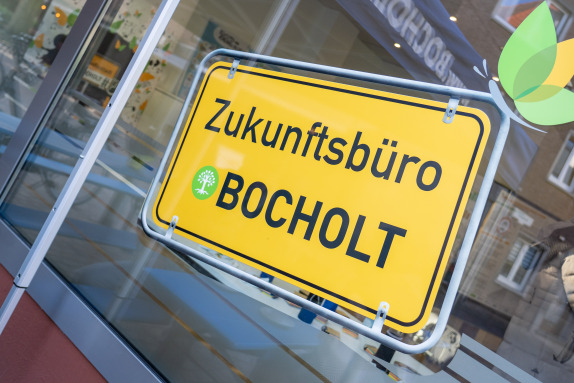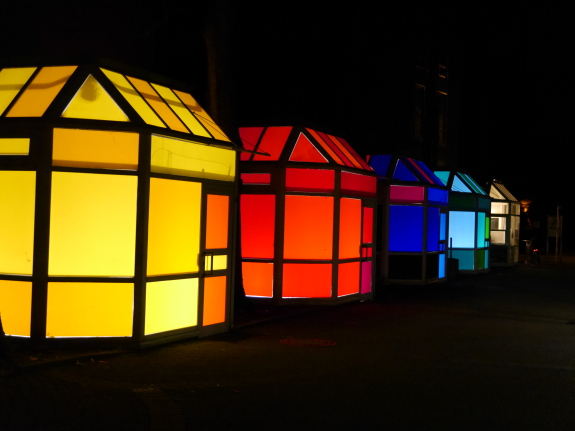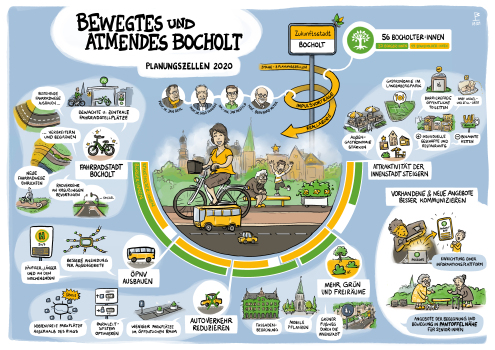Project: City of the future - 2015-2022
City of the future Bocholt - Breathing, moving Bocholt 2030+
A robot night watchman, electric cargo bikes throughout the city and bilingual teaching in all schools. This is what Bocholt could look like in 2030 - or something completely different!
There are many ideas for Bocholt that will improve life in the city. The Federal Ministry of Education and Research's "Zukunftsstadt" competition was all about discussing these ideas with citizens, developing and testing joint visions for the future. Bocholt successfully completed the first and second phases, in which around 50 cities nationwide took part. Bocholt was one of eight cities to make it through to the third and final round!
In Bocholt, the vision for the future was entitled "Breathing Bocholt 2030+". After a concept with various measures was developed in the second phase, the final third phase focussed on the implementation and testing of these measures in so-called real-world laboratories.
What will the city of tomorrow look like?
This question was the focus of the "Future City" competition organised by the Federal Ministry of Education and Research (BMBF) since the Science Year 2015. In the third and final phase, eight cities, municipalities and districts worked together with citizens, science, local politics, business and administration to develop sustainable instruments for realising the vision of their municipality in 2030.
Bocholt was one of them.
The focus here was on the areas of
- Economy and internationalisation
- Education / qualification
- Quality of life, new urbanity, neighbourhood development
- Mobility and infrastructure
- Communication
What can Bocholt do? What does Bocholt need? What should Bocholt stand for?
Bringing together and expanding city qualities
Bocholt did not start from scratch. Bicycle city, climate municipality, university city, neighbourhood and volunteer management, Regional 2016 large-scale project, European city and much more - Bocholt has already been able to showcase interesting municipal projects, concepts and approaches.
The aim was to interweave and further link these approaches based on strengths and characteristics in order to remain attractive as a medium-sized city in Münsterland and a strong location - for new residents, companies, school pupils and students.
Workshops, surveys, media competitions
Bocholt's application was entitled "Atmendes, beweges Bocholt 2030+".
Citizens were asked to express their ideas on how they see their city from 2030 onwards. In the various phases, public workshops were organised, school projects were set up and citizens were asked on the street about their ideas for a "Breathing Bocholt 2030+". A large future conference or so-called planning cells under the influence of the corona pandemic formed the focal points of the phases.
Partners
During the project phases, scientific support was provided by the project partner at the University of Wuppertal (Institute for Democracy and Participation Research - Citizen Participation Research Centre). This support was supplemented by a scientific partner from the field of urban research and a partner from the sports and health sciences.
Background to the "City of the Future" competition:
In 2015, cities, municipalities and districts across Germany were able to apply with a concept for the development of a sustainable Vision 2030+. 52 municipalities were selected by an independent jury of experts from 168 applications for the first phase. In the first phase of the competition during the Year of Science 2015 - City of the Future, the municipalities developed a vision with a time horizon of 2030+ for their municipality in a public participation process and drew up proposals for action and implementation.
In the second phase from 2017, up to 20 selected municipalities scientifically analysed these ideas and developed a concept ready for implementation.
As part of the final third phase, the first innovative ideas were finally put into practice in eight selected municipalities in so-called "real laboratories".
The "Future City" competition showed how citizens and research can already contribute to making cities sustainable and liveable. Citizens, science, business, politics and administration jointly developed visions for the future of their communities and trialled them on site.
Zukunftsstadt was an initiative of the Federal Ministry of Education and Research (BMBF). City of the Future competition: www.wettbewerb-zukunftsstadt.de
Competition in three phases
In the first phase, ideas were collected together with citizens, local politicians, scientists and local businesses, which were incorporated into the development of the vision for the future.
In the second phase, a concept was developed from these ideas.
In the third phase, the first parts of the concept were implemented and trialled.
Only eight of the original 52 municipalities made it to this phase - and Bocholt was there and successfully completed all phases!
Phases of the national competition
Phase 1
Ideas, goals, measures
The goal of a sustainable socio-ecological positioning of the city of Bocholt requires a constructive interplay between "solid" and "innovative" cities.
The "Breathing Bocholt 2030+" vision for the future assumes that a city will only "breathe" in the future if it taps into the creativity of civil society stakeholders and utilises it in a creative discovery process with politicians and administrators. The city's citizens and the many organisations in the third sector, the economy and universities play a central role in this. The scientific community accompanied the process, focussed on global trends and contributed to the creation of new framework conditions and intervention potential.
Results
Civil society was actively involved in the dialogue on the future through various media and events, including four workshops. Needs for action were identified in the following 5 areas:
- "Economy/Internationalisation",
- "Education/qualification",
- "Quality of life/new urbanity/neighbourhood",
- "Communication" and
- "Mobility/Infrastructure".
In the second phase, focus groups were formed for these subject areas to develop specific approaches for action. These were brought together and systematised into a comprehensive action plan "Breathing Bocholt 2030+". Concrete successes have already been achieved in the area of "Internationalisation".
A future conference concluding Phase 1 has set the course for further systematic work.
Phase 2
City of the future 2nd phase
The objectives of the 2nd phase were summarised under the slogan "from vision to concept" and consisted of testing the ideas of the vision from the 1st phase and the results of the workshops on the identified strategic fields of action such as education and learning, quality of life and health, among others, in experimental and explorative real-world laboratories with regard to their feasibility and impact.
During the 18-month project period, the vision "Breathing Bocholt 2030+" was further developed into a planning and implementation concept with scientific support and the involvement of citizens and other civil society stakeholders. To this end, the existing approaches of the individual development steps were concretised, further developed and brought together in the overall strategy.
Experimental real-world laboratories
In the area of quality of life, health, physical activity and health, three scientific conferences were organised in 2017:
- "Active ageing in the neighbourhood" - Senior citizens and their participation in the city: exercise and physical activity as prevention and rehabilitation; findings from basic research in the area of "Exercise, cognition and dementia" (Prof. Hollmann, Prof. Schneider, German Sport University Cologne)
- "Exercise starts at the front door" - exercise opportunities in the immediate vicinity of homes as a basis for health (Prof Froboese, German Sport University Cologne)
- "Fit and Cool" - Sport and exercise for young people in social spaces from the perspective of trend sports development and changing youth culture in urban social spaces (Prof Michels, Prof Deinet, Düsseldorf University of Applied Sciences).
- In the area of internationalisation of the economy, a "Young University" was realised in cooperation between the Westphalian University of Applied Sciences and its development company and the city of Bocholt.
- The internationalisation of the economy was continued by strengthening the German-Dutch network office.
- An interactive street atlas of future activities in the city visualises the city's measures in this area. Innovative measures are continually being added to it.
Planning cells
The final and focal point of the first two phases of the "Future City" project was the implementation of a planning cell process as a systematic form of participation in November 2017. Representatively selected citizens were presented with the results of phases 1 and 2 of Bocholt's City of the Future for discussion and evaluation in two parallel planning cells. The establishment of a future office and the continuation of corresponding participation formats in the future were by far the most important result of all planning cells.
Citizens' report
The citizens' report that emerged from this process was presented to the mayor of the city, Peter Nebelo, at a well-attended public event on 2 March 2018. The general consensus was that the systematic good governance process that had been initiated should now be made permanent and expanded.
Future Council
In order to ensure the continuity of participation and strengthen a culture of cooperation, the participants elected 10 people to Future Councils. This group was supplemented by stakeholders from business, administration and politics. The Future Council dealt with the tasks of a future office, town hall renovation and neighbourhood development in Bocholt.
Results
In conclusion, it can be stated for Bocholt that the central vision "Breathing Bocholt" with its sustainability claim proved to be viable and capable of achieving consensus in the urban negotiation processes. It was important for Bocholt's development that the different perspectives of politics, administration and urban society were systematically and successfully brought together for the first time in the workshops of the first and second phases as well as in the publicly recognised final conferences. This created an urban infrastructure for strategy implementation (social space and neighbourhood orientation) with corresponding communication and monitoring functions.







